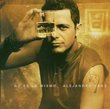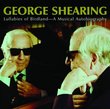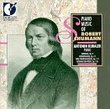| All Artists: Erich Wolfgang Korngold, Erich Leinsdorf, Carol Nebrett, René Kollo, Hermann Prey, Münchner Rundfunkorchester, Chor des Bayerischen Rundfunks, Benjamin Luxon, Rose Wagemann, Gabriele Fuchs, Patricia Clark, Tölzer Knabenchor Title: Korngold - Die tote Stadt / Leinsdorf Members Wishing: 0 Total Copies: 3 Label: RCA Release Date: 7/2/1991 Genre: Classical Styles: Opera & Classical Vocal, Historical Periods, Modern, 20th, & 21st Century Number of Discs: 2 SwapaCD Credits: 2 UPC: 078635776720 |
Search - Erich Wolfgang Korngold, Erich Leinsdorf, Carol Nebrett :: Korngold - Die tote Stadt / Leinsdorf
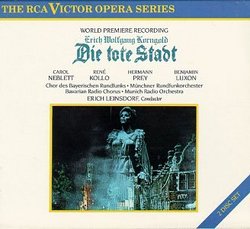 | Erich Wolfgang Korngold, Erich Leinsdorf, Carol Nebrett Korngold - Die tote Stadt / Leinsdorf Genre: Classical
![header=[] body=[This CD is available to be requested as disc only.]](/images/attributes/disc.png?v=a4e11020) ![header=[] body=[This CD is available to be requested with the disc and back insert.]](/images/attributes/disc_back.png?v=a4e11020) ![header=[] body=[This CD is available to be requested with the disc and front insert.]](/images/attributes/disc_front.png?v=a4e11020) ![header=[] body=[This CD is available to be requested with the disc, front and back inserts.]](/images/attributes/disc_front_back.png?v=a4e11020) |
Larger Image |
CD DetailsSimilarly Requested CDs
|
CD ReviewsHow did this ever become a forgotten opera?? MartinP | Nijmegen, The Netherlands | 04/30/2004 (5 out of 5 stars) "All that has remained in the repertoire of this excellent work are the duly famous 4 minutes of `Marietta's Lied`, hailed by some as one of the most beautiful things in all 20th century opera. It certainly packs an emotional punch worthy of Puccini at his peak, and its return at the very end is heart wrenching. I've seen critics regret the fact that the rest of Die Tote Stadt is 'not on the same level', but really, that's a bit like complaining the rest of Turandot is not quite like Nessun dorma... In fact, the opera was a huge success at its premiere and widely admired by contemporary composers, Puccini as well as Alban Berg among them. And rightly so, which can only make us wonder more at its subsequent neglect. Korngold is just one of those composers who never really made it into the limelight, even though he wrote much that is instantly accessible and quite exciting. Indeed, the whole two hours of this piece are enthralling, mainly on the strength of the expert and colourful writing for the (gargantuan) orchestra. Imagine a kind of Elektra meets Gurrelieder cocktail with an added dash of Zemlinsky, Mahler and, yes, Puccini, and you may get some idea of what to expect. I was also put in mind of that other forgotten great opera, Pfitzner's Palestrina. It doesn't make for relaxed listening: the general tone is a bit too excited and even hysterical for that, as befits an opera exploring the obviously Freudian theme of mourning gone haywire. But it's anything but monotonous. One moment a boating song plunges you straight into the world of Viennese light operetta, the next this gay party is subsumed by the extraordinary and spectacular sounds of an organ and a plethora of bells, and you are in a sound world that is as modern as it is captivating. The vocal parts are extremely agitated and rather highly strung; I cannot help but feel they occasionally overtax the lead singers. Both Neblett and Kollo produce some very strained, even shrill top notes, and there are many top notes in both parts! On the whole, however, the singing is admirable, and the orchestral playing is of an even higher order. The recording, too, though 30 years old, is quite good: it allows you to hear lots of detail, and has an ample dynamic range. We ought to be rightly grateful for having it, and as long as there is no competition other than Segerstam's live recording on Naxos, this set is very much worth acquiring. Meanwhile, there certainly is room for a high profile modern remake. Wouldn't it be a perfect way for Chailly to start his tenure at the helm of the Leipzig Opera and Gewandhausorchester? If Decca would then be so kind as to hire Renée Fleming as Marietta, something truly wonderful might come out..." Lush indeed - more Strauss than Zemlinsky NPW | Paris France | 10/08/2000 (5 out of 5 stars) "As another reviewer notes, this 1975 RCA recording, with deluxe cast under Leinsdorf is lush. (The Amazon listing seems to start the cast off alphabetically, so the reader may not guess that it stars Neblett, Kollo, Prey and Luxon.) As such, it draws Die tote Stadt nearer to "big" Strauss operas (Die Frau ohne Schatten, Danae, Helena...) than to early Schoenberg or Zemlinsky. The world premiere recording, it is something of a monument, a reference recording, and deserves 5 stars. However, another recording exists, a live Naxos set from the Swedish Royal opera, less lush but perhaps more dramatic, that those fond of the harmonies and orchestration of the Gurrelieder or Zemlinsky will appreciate. As will those on a tight budget - the Naxos set is almost half the price of the RCA/Leinsdorf box." Unendurable Beauty Opera-rater | Fayetteville, AR | 09/03/2005 (5 out of 5 stars) "The poetry of the libretto, the Italianate vocal writing, the stunning
harmonic vocabulary all make for an opera of almost unendurable beauty. The commedia dell'arte scene in the second act provides the only "light" touch, and it is also heavily colored in fin-du-siecle tones. When the music of the first act duet returns to finish the opera, it is enough to wring tears from a stone. A must have recording, worth serious investigation. I have the Naxos recording as well: If budget allows, get them both." |

 Track Listings (11) - Disc #1
Track Listings (11) - Disc #1
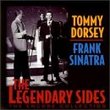
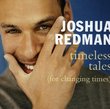
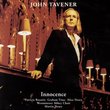
![Jazz for the Open Road [Bonus CD]](https://nationalbookswap.com/cd//m/08/0708/630708.jpg)
